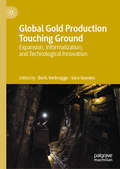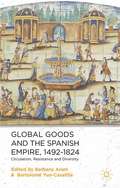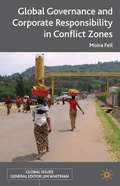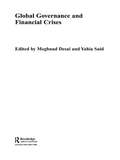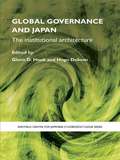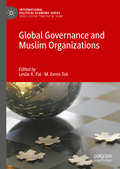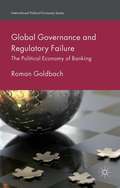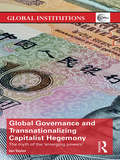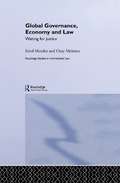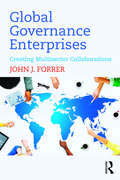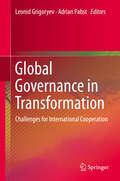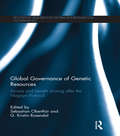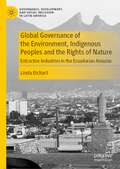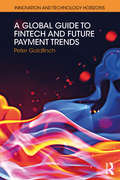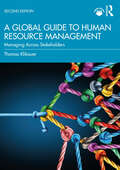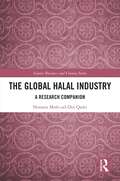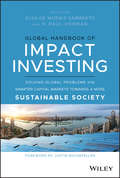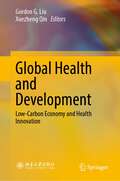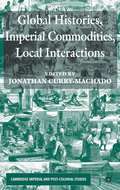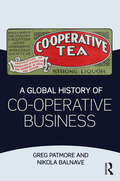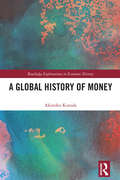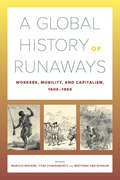- Table View
- List View
Global Gold Production Touching Ground: Expansion, Informalization, and Technological Innovation
by Boris Verbrugge Sara GeenenIn recent decades, gold mining has moved into increasingly remote corners of the globe. Aside from the expansion of industrial gold mining, many countries have simultaneously witnessed an expansion of labor-intensive and predominantly informal artisanal and small-scale gold mining. Both trends are usually studied in isolation, which contributes to a dominant image of a dual gold mining economy. Counteracting this dominant view, this volume adopts a global perspective, and demonstrates that both industrial gold mining and artisanal and small-scale gold mining are functionally integrated into a global gold production system. It couples an analysis of structural trends in global gold production (expansion, informalization, and technological innovation) to twelve country case studies that detail how global gold production becomes embedded in institutional and ecological structures.
Global Goods and the Spanish Empire, 1492–1824
by Bethany Aram Bartolomé Yun-CasalillaDrawing upon economic history, cultural studies, intellectual history and the history of science and medicine, this collection of case studies examines the transatlantic transfer and transformation of goods and ideas, with particular emphasis on their reception in Europe.
Global Governance and Corporate Responsibility in Conflict Zones
by Moira FeilCorporations in conflict zones and their provision of security are particularly relevant for understanding whether private actors are increasingly sources of governance contributions that regulate public goods. Feil highlights the discrepancies between political and theoretical expectations of corporate engagement and governance contributions.
Global Governance and Financial Crises (Routledge Studies In The Modern World Economy)
by Meghnad Desai Yahia SaidThe editors of this book have pulled together a collection of chapters that review the spate of financial crises that have occurred in recent years starting with Mexico in 1994 and moving on to more recent crises in Turkey and Argentina. With impressive contributors such as Douglas Gale, Gabriel Palma and Andrew Gamble, the book is a timely and aut
Global Governance and Japan: The Institutional Architecture (The University of Sheffield/Routledge Japanese Studies Series)
by Glenn D. Hook Hugo DobsonLeading specialists from Europe and Japan examine the institutional mechanisms of governance at the global level and provide concrete evidence of the role Japan plays in these institutions. An excellent introduction to the concept of global governance, the volume analyzes how global governance actually works through the global institutional mechanisms of governance. It provides an up-to-date and contemporary analysis of the six most important global institutions, namely: the Group of 7/8 the Organisation for Economic Cooperation and Development the World Bank the International Monetary Fund the World Trade Organization the United Nations. Written clearly and concisely, the book provides a thorough and accessible discussion on Japan’s role within these institutions and uses supporting case studies to ask whether Japan is reactively or proactively involved in trying to shape these institutions in order to promote its own interests. As such, it will be a valuable resource for undergraduates and scholars with an interest in global governance, Japanese politics and political economy.
Global Governance and Muslim Organizations (International Political Economy Series)
by M. Evren Tok Leslie A. PalThere are 1.6 billion Muslims in the world, represented on the world stage by 57 states, as well as a host of international organizations and associations. This book critically examines the engagement of these states in systems of global governance and with a variety of policy regimes, including climate change, energy, migration, humanitarian aid, international financial institutions, research and education. Chapters explore the dynamics of this engagement, the contributions to global order, the interests pursued and some of the contradictions and tensions within the Islamic world, and between that world and the ‘West’. An in-depth perspective is provided about the traditional and new forms of multilateralism and the policy spaces formed which provide new opportunities for the Muslim and non-Muslim world alike.
Global Governance And Regulatory Failure
by Roman GoldbachDoes global governance contribute to regulatory failure and financial crises? And, if it does, should we enhance global cooperation to prevent future crises or confine our focus on the national level? Roman Goldbach reveals that, while global cooperation of bank regulators should minimise the emergence of financial crises, it actually contributes to the build-up of financial bubbles and the resulting turmoil. Underlying this regulatory failure is the transnational regulatory regime that globalises the governance structure and policy process of regulating banks. It entrenches asymmetric influence in a manner that raises the possibilities of national and transnational firms integrating their preferences into global regulatory standards, while at the same time decreasing the incentives for, and capacities of, politicians and regulators to protect the public good of systemic stability. Moreover, Goldbach argues that the underlying governance structure remains intact to date, which promises comparable future regulatory failure. The book provides both a theoretical framework of the global political economy of banking regulation and a detailed analysis of the policies and politics of the Basel Committee on Banking Supervision and its two most recent global standards- the Basel II and Basel III frameworks. Goldbach's innovative analysis, which integrates all actors and institutions of the global political economy and builds on new empirical material from national, transnational, and international processes, demonstrates how global governance has contributed to the onset of the "Great Recession" and how it continues to increase the likelihood of future global financial crises.
Global Governance and Transnationalizing Capitalist Hegemony: The Myth of the 'Emerging Powers' (Global Institutions)
by Ian TaylorThis book is a critique of claims regarding how emerging economies are supposedly rewriting the rules of global governance and ushering in alternative models to neoliberal orthodoxy. It argues that such assumptions are abstractions that ignore both the transnationalizing nature of the global political economy and the actual policy goals of the ruling classes within most emerging economies. Considering the larger issues behind the emerging economies (or powers) debate, the book deploys an adapted global capitalism perspective with insights from Gramsci, Poulantzas and Cox, to argue that the transnational nature of the global political economy and the actual policy goals of the dominant elites within most emerging economies merge to undermine any transformative element. Far from challenging the global order, these ostensible new rivals in fact seek to integrate their economies more and more within the existing liberal global economy. Inter-state dynamics and even inter-elite tensions exist and it is clear that the nation state has not simply become a transmission belt for global capital, but equally we must move beyond the surface phenomena that are most visible in global tensions to get at the underlying essence of social and class forces in the global political economy. Looking at the largest emerging powers, such as Brazil, Russia, India and China, Taylor explains why the emerging powers’ elites, although essentially subscribing to neoliberalism (in all its variegated forms) may confront the core in a myriad of ways, but that these are not challenges to the ongoing world order and, in fact, the so-called emerging powers serve a legitimizing function for the extant global system. The book will be of great use to graduates and scholars of International Relations, Global/International Political Economy and International Development.
Global Governance, Economy and Law: Waiting for Justice (Routledge Studies In International Law Ser. #Vol. 4)
by Errol Mendes Ozay MehmetThis book provides a critical examination of the most important institutions of global governance in the world today. Drawing on history, political science, law and economics, the authors examine institutions such as the United Nations, the World Trade Organization (WTO), the International Monetary Fund (IMF), the World Bank and also the global pri
Global Governance Enterprises: Creating Multisector Collaborations
by John J. ForrerGlobal Governance Enterprises focuses on a specific multi-sector collaboration—the formation of an entity that carries out global governance—providing a detailed analysis of the context of their emergence, as well as how they are created, managed, and sustained. Forrer considers the growing challenges to successful global governance and the role of multi-sector collaborations in overcoming these challenges, arguing that such partnerships should be considered successful only when they meet specific conditions that ensure they are “doing well” and “doing good.” By establishing a coherent framework to define global governance enterprises across a wide span of sectors, the book develops a strong theoretical foundation for this type of partnership and provides the reader with an understanding of the practical, operational realities of organizing, financing, and sustaining global governance enterprises. It includes a full section of case studies, ranging from healthcare to environmental organizations, providing practical insight into this form of governance and its function. This book should be on the shelf of any professional or student interested in global governance, public–private partnerships, or public management.
Global Governance in Transformation: Challenges for International Cooperation
by Leonid Grigoryev Adrian PabstThis book analyzes the state of global governance in the current geopolitical environment. It evaluates the main challenges and discusses potential opportunities for compromise in international cooperation. The book’s analysis is based on the universal criteria of global political stability and the UN framework of sustainable development. By examining various global problems, including global economic inequality, legal and political aspects of access to resources, international trade, and climate change, as well as the attendant global economic and political confrontations between key global actors, the book identifies a growing crisis and the pressing need to transform the current system of global governance. In turn, it discusses various instruments, measures and international regulation mechanisms that can foster international cooperation in order to overcome global problems. Addressing a broad range of topics, e.g. the international environmental regime, global financial problems, issues in connection with the energy transition, and the role of BRICS countries in global governance, the book will appeal to scholars in international relations, economics and law, as well as policy-makers in government offices and international organizations.
Global Governance of Genetic Resources: Access and Benefit Sharing after the Nagoya Protocol (Routledge Research in Global Environmental Governance)
by Sebastian Oberthür G. Kristin RosendalThis book analyses the status and prospects of the global governance of Access Benefit Sharing (ABS) in the aftermath of 2010’s Nagoya Protocol to the Convention on Biological Diversity (CBD). The CBD’s initial 1992 framework of global ABS governance established the objective of sharing the benefits arising from the use of genetic resources fairly between countries and communities. Since then, ABS has been a contested issue in international politics – not least due to the failure of effective implementation of the original CBD framework. The Nagoya Protocol therefore aims to improve and enhance this framework. Compared to the slow rate of progress on climate change, it has been considered a major achievement of global environmental governance, but it has also been coined a ‘masterpiece of ambiguity’. This book analyses the role of a variety of actors in the emergence of the Nagoya Protocol and provides an up-to-date assessment of the core features of the architecture of global ABS governance. This book offers a central resource regarding ABS governance for those working on and interested in global environmental governance. This is achieved by focusing on two broad themes of the wider research agenda on global environmental governance, namely architecture and agency. Furthermore, individual chapter contributions relate and link ABS governance to other prominent debates in the field, such as institutional complexes, compliance, market-based approaches, EU leadership, the role of small states, the role of non-state actors and more. Partly due to its seeming technical complexity, ABS governance has so far not been at the centre of attention of scholars and practitioners of global environmental governance. In this book, care is taken to provide an accessible account of key functional features of the governance system which enables non-specialists to gain a grasp on the main issues involved, allowing the issue of ABS governance to move centre-stage and be more fully recognised in discussions on global environmental governance.
Global Governance of the Environment, Indigenous Peoples and the Rights of Nature: Extractive Industries in the Ecuadorian Amazon (Governance, Development, and Social Inclusion in Latin America)
by Linda EtchartThis book explores the obstacles facing indigenous communities, non-governmental organizations, governments, and international institutions in their attempts to protect the cultures of indigenous peoples and the world’s remaining rainforests.Indigenous peoples are essential as guardians of the world’s wild places for the maintenance of ecosystems and the prevention of climate change. The Amazonian/Andean indigenous philosophies of sumac kawsay/suma qamaña (buen vivir) were the inspiration for the incorporation of the Rights of Nature into the Ecuadorian and Bolivian constitutions of 2008 and 2009. Yet despite the creation of the United Nations Permanent Forum on Indigenous Issues (2000), and the adoption of the United Nations Declaration on the Rights of Indigenous Peoples (2007), indigenous peoples have been marginalized from intergovernmental environmental negotiations. Indigenous environment protectors’ lives are in danger while the Amazon rainforests continue to burn.By the third decade of the 21st century, the dawn of “woke” capitalism was accompanied by the expansion of ethical investment, with BlackRock leading the field in the “greening” of investment management, while Big Oil sought a career change in sustainable energy production. The final chapters explain the confluence of forces that has resulted in the continued expansion of the extractive frontier into indigenous territory in the Amazon, including areas occupied by peoples living in voluntary isolation.Among these forces are legal and extracurricular payments made to individuals, within indigenous communities and in state entities, and the use of tax havens to deposit unofficial payments made to secure public contracts. Solutions to loss of biodiversity and climate change may be found as much in the transformation of global financial and tax systems in terms of transparency and accountability, as in efforts by states, intergovernmental institutions and private foundations to protect wild areas through the designation of national parks, through climate finance, and other “sustainable” investment strategies.
Global Growth and Financial Spillovers and the South African Macro-economy
by Mthuli Ncube Eliphas Ndou Nombulelo GumataTo what extent is South Africa affected by G8 economies and BRIC growth shocks? This book identifies channels that amplify these shock effects, the relevance of third country transmission effects and the effects of the first and second rounds of US quantitative easing. The changing reactions of South African variables over time to financial shocks emanating from the US and selected countries in the Euro area, is presented. The book quantifies the effects of capital flow shocks, determines the counterfactuals of asset prices and economic growth variables, and compares the contribution of capital flows and domestic macro factors on asset prices. The effects of the exchange rate depreciation are contrasted to the decline in investment as key drivers of the trade balance. Stock market interdependence is determined amongst South African, Indian and Brazilian equities. The contributions of stock price returns and volatility on South African economic growth are contrasted. The authors construct a financial stress index for South Africa and determine how it amplifies shocks.
A Global Guide to FinTech and Future Payment Trends (Innovation and Technology Horizons)
by Peter GoldfinchBeing able to make and receive payments is an essential facet of modern life. It is integral to the banking and finance systems, and it touches all global citizens. In some areas, payment systems are rapidly evolving – moving swiftly from paper payment instruments, to electronic, to real-time – but in others, underdeveloped payment systems hold back economic and social development. This book is intended to assist the reader in navigating the payments landscape. The author explores highly topical areas, such as the role of payment systems in enabling commerce to contribute to the development of emerging economies, the evolution of payment systems from paper instruments to computerization, the role of cryptocurrencies, and the slow decline of plastic credit and debit cards owing to alternative forms of payment being introduced. Altogether, this book provides a comprehensive overview of the evolution of payment and offers projections for the future, encouraging readers to explore their own predictions, using the framework that the book has provided. It is vital reading for technologists, marketers, executives and investors in the FinTech sector, as well as academics teaching business and technology courses.
A Global Guide to Human Resource Management: Managing Across Stakeholders
by Thomas KlikauerA Global Guide to Human Resource Management is a concise HRM introductory text offering a uniquely non-region-specific approach to people management in international business organisations. The book presents an alternative to standard managerial approaches, reflecting the perspectives of multiple stakeholders (workers, trade unions, states and governments, NGOs) to critically evaluate HRM in practice and, in so doing, enables students to make effective decisions in their own practice, wherever their careers take them. Its accessibility and concision make it well suited to short courses for non-HRM and non-business specialists. This text covers all major introductory topics for non-specialists, introducing the concept and purpose of HRM, through recruitment, people, skills, designing work, promoting health, rewarding success, and successful and ethical people management. This edition includes a new chapter on green HRM. Rich with pedagogical features, the book includes five case studies per chapter to connect theory with practice. It is also supported with a range of instructor materials including online guest lectures, general discussion questions, a glossary, an index, and online documentaries that explain how to manage people. It is essential reading for students interested in Human Resources and Personnel Management, Organisational Behaviour and Development and Workplace Culture.
Global Guyana: Shaping Race, Gender, and Environment in the Caribbean and Beyond
by Oneka LaBennettExposes the global threat of environmental catastrophe and the forms of erasure that structure Caribbean women’s lives in the overlooked nation of GuyanaPreviously ranked among the hemisphere’s poorest countries, Guyana is becoming a global leader in per capita oil production, a shift which promises to profoundly transform the nation. This sea change presents a unique opportunity to dissect both the environmental impacts of modern-world resource extraction and the obscured yet damaging ways in which intersectional race and gender formations circumscribe Caribbean women’s lives.Drawing from archival research and oral history, and examining mass-mediated flashpoints across the African and Indian diasporas—including Rihanna’s sonic routes, ethnic conflict reportage, HBO’s Lovecraft Country, and Netflix’s Indian Matchmaking—Global Guyana repositions this marginalized nation as a nexus of social and economic activity which drives popular culture and ideas about sexuality while reshaping the geopolitical and literal topography of the Caribbean region. Oneka LaBennett employs the powerful analytic of the pointer broom to disentangle the symbiotic relationship between Guyanese women’s gendered labor and global racial capitalism. She illuminates how both oil extraction and sand export are implicated in a well-established practice of pillaging the Caribbean’s natural resources while masking the ecological consequences that disproportionately affect women and children.Global Guyana uncovers how ecological erosion and gendered violence are entrenched in extractive industries emanating from this often-effaced but pivotal country. Sounding the alarm on the portentous repercussions that ambitious development spells out for the nation’s people and its geographical terrain, LaBennett issues a warning for all of us about the looming threat of global environmental calamity.
The Global Halal Industry: A Research Companion (Islamic Business and Finance Series)
by Hussain Mohi-ud-Din QadriThe word ‘Halal’ translates to ‘permissible’ in English, though it encapsulates a broader meaning that goes beyond permissibility and impermissibility. Halal incorporates hygiene, cleanliness, legality, compliance, ethics as well as cultural aspects. This book provides a holistic overview of the relevant concepts but also covers Shariah, commercial, regulatory and technological aspects of the global Halal industry. It is not confined to a specific region, country or sector, rather it gives a comprehensive summary of the developments and growth across all sectors of the Halal industry, at the regional but also the global level.It is a well-researched and accessible volume which sets out to demystify some of the more challenging areas and offers an in-depth synopsis of each of the research questions it answers. The book also contributes a series of chapters with specialized treatment. It explores the key Shariah issues and guiding principles of Islamic law, technical know-how within various sectors such as Halal food, tourism, cosmetics, pharma, logistics, supply chain, media & fashion and offers a discussion on Artificial intelligence, quantum technology, and blockchain in different sectors of the Halal industry. Moreover, this work proposes viable solutions to the challenges faced by the industry such as the harmonization of Halal standards.Beneficial to audiences of all levels from beginners to advanced, it will be a handy reference for researchers and advanced students studying Islamic business and economics, Halal management, nutritional sciences, tourism, media, fashion and pharmaceuticals. It will also be of benefit to practitioners, policymakers and legal and standard-setting bodies.
Global Handbook of Impact Investing: Solving Global Problems Via Smarter Capital Markets Towards A More Sustainable Society
by Elsa De Morais Sarmento Paul R. HermanDiscover how to invest your capital to achieve a powerful, lasting impact on the world.The Global Handbook of Impact Investing: Solving Global Problems Via Smarter Capital Markets Towards A More Sustainable Society is an insightful guide to the growing world-wide movement of Impact Investing. Impact investors seek to realize lasting, beneficial improvements in society by allocating capital to sources of impactful and sustainable profit. This Handbook is a how-to guide for institutional investors, including family offices, foundations, endowments, governments, and international organizations, as well as academics, students, and everyday investors globally. The Handbook´s wide-ranging contributions from around the world make a powerful case for positive impact and profit to fund substantive, lasting solutions that solve critical problems across the world. Edited by two experienced and distinguished professionals in the sustainable investing arena and authored by two dozen renowned experts from finance, academia, and multilateral organizations from around the world, the Global Handbook of Impact Investing educates, inspires, and spurs action towards more responsible investing across all asset classes, resulting in smarter capital markets, including how to: · Realize positive impact and profit · Integrate impact into investment decision-making and portfolio · Allocate impactful investments across all asset classes · Apply unique Impact Investing frameworks · Measure, evaluate and report on impact · Learn from case examples around the globe · Pursue Best Practices in Impact Investing and impact reporting While other resources may take a local or limited approach to the subject, this Handbook gathers global knowledge and results from public and private institutions spanning five continents. The authors also make a powerful case for the ability of Impact Investing to lead to substantive and lasting change that addresses critical problems across the world.
Global Health and Development: Low-Carbon Economy and Health Innovation
by Gordon G. Liu Xuezheng QinThis book reviews the global preparedness to pandemic challenges to human health and development by compiling the brilliant ideas of experts and entrepreneurs from the fields of public health, health economics, environmental engineering, pharmaceutical interventions, and other related fields.This book proposes a collective effort to take pandemic prevention, preparedness, and response seriously and prioritize it accordingly to avoid the potential catastrophe in this inter-connected world by summarizing the lessons learned from the COVID-19. In the context of today’s climate change and its association with human health, the book presents the need for aligning climate and health goals and puts up with the multi-sectors and low-carbon economic strategies where health is prioritized in development.Furthermore, when more and more novel medical and pharmaceutical items worldwide are launched, the health system could be improved. With the help of digital health, artificial intelligence (AI), and other innovative forms of healthcare products, the efficiency and effectiveness of healthcare services provision could be promoted, leading to a more promising future for human health.This book vividly presents how such new technologies are applied to build an intelligent and robust health system and how innovations can be used to promote human health.
Global Healthcare Exchange
by Jamie Ladge Lynda M. ApplegateFounded in March 2000 at the height of the dot-com bubble, Global Healthcare Exchange (GHX) was one of 90 online marketplaces in the health care industry. The company's founders were among the largest suppliers in the industry, including Johnson & Johnson, GE Medical, Abbot, Baxter, and Medtronic. Becton-Dickinson, Braun, Guidant, Tyco, Siemens, C.R. Bard, and other key suppliers joined shortly after the company was founded. At the time of the case (spring 2003), GHX was the largest of the three remaining online health care marketplaces and ownership had expanded to include the leading players across all parts of the value chain, including health care providers and managed care organizations. Group purchasing organizations, distributors, and company executives must address key strategic issues, including integrating its latest merger, achieving profitability, defining a fair pricing strategy, and determining the pace of global expansion.
Global Histories, Imperial Commodities, Local Interactions
by Jonathan Curry-MachadoThe papers presented in this collection offer a wide range of cases, from Asia, Africa and the Americas, and broadly cover the last two centuries, in which commodities have led to the consolidation of a globalised economy and society - forging this out of distinctive local experiences of cultivation and production, and regional circuits of trade.
A Global History of Co-operative Business
by Greg Patmore Nikola BalnaveCo-operatives provide a different approach to organizing business through their ideals of member ownership and democratic practice. Every co-operative member has an equal vote regardless of his or her own personal capital investment. The contemporary significance of co-operatives was highlighted by the United Nations declaration of 2012 as the International Year of Co-operatives. This book provides an international perspective on the development of co-operatives since the mid-nineteenth century, exploring the economic, political, and social factors that explain their varying fortunes and transformation into different forms. By looking at what co-operatives are; how they have changed; the developments as well as the persecutions of the co-operative movement; and how it is an important force in promoting development and self-sufficiency in non-industrialized areas, this book provides valuable insight not only to academics, but also to practitioners and policy makers.
A Global History of Money (Routledge Explorations in Economic History)
by Akinobu KurodaLooking from the 11th century to the 20th century, Kuroda explores how money was used and how currencies evolved in transactions within local communities and in broader trade networks. The discussion covers Asia, Europe and Africa and highlights an impressive global interconnectedness in the pre-modern era as well as the modern age. Drawing on a remarkable range of primary and secondary sources, Kuroda reveals that cash transactions were not confined to dealings between people occupying different roles in the division of labour (for example shopkeepers and farmers), rather that peasants were in fact great users of cash, even in transactions between themselves. The book presents a new categorization framework for aligning exchange transactions with money usage choices. This fascinating monograph will be of great interest to advanced students and researchers of economic history, financial history, global history and monetary studies.
A Global History of Runaways: Workers, Mobility, and Capitalism, 1600–1850 (California World History Library #28)
by Marcus Rediker Titas Chakraborty Matthias Van RossumDuring global capitalism's long ascent from 1600–1850, workers of all kinds—slaves, indentured servants, convicts, domestic workers, soldiers, and sailors—repeatedly ran away from their masters and bosses, with profound effects. A Global History of Runaways, edited by Marcus Rediker, Titas Chakraborty, and Matthias van Rossum, compares and connects runaways in the British, Danish, Dutch, French, Mughal, Portuguese, and American empires. Together these essays show how capitalism required vast numbers of mobile workers who would build the foundations of a new economic order. At the same time, these laborers challenged that order—from the undermining of Danish colonization in the seventeenth century to the igniting of civil war in the United States in the nineteenth.
